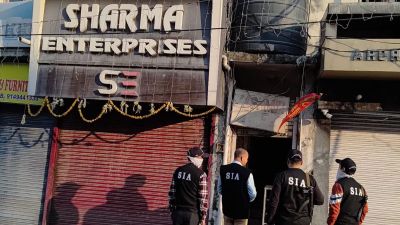Undeterred by Delhi arrests, Punjab not likely to tweak its excise policy
Functionaries of the Punjab government told The Indian Express that the state is expecting to make Rs 8,800 crore from excise collections by the end of March in the current fiscal and likely to record an increase of Rs 2,600 crore compared to last year.
 The developments in Delhi in the alleged liquor policy scam, or the Enforcement Directorate (ED) questioning two officials of the excise department for that matter hasn't deterred the state. The ED chargesheet had also stated that a Mahadev liquors’ distillery in Punjab was sealed on oral orders to settle some issues in Delhi.
The developments in Delhi in the alleged liquor policy scam, or the Enforcement Directorate (ED) questioning two officials of the excise department for that matter hasn't deterred the state. The ED chargesheet had also stated that a Mahadev liquors’ distillery in Punjab was sealed on oral orders to settle some issues in Delhi. Arrest of Delhi government functionaries in the alleged excise scam has not put a dampener on the Aam Aadmi Party (AAP) government in Punjab, rather it is mulling replicating the existing excise policy for the next fiscal also, buoyed by the collections.
Functionaries of the Punjab government told The Indian Express that the state is expecting to make Rs 8,800 crore from excise collections by the end of March in the current fiscal and likely to record an increase of Rs 2,600 crore compared to last year.
“The amount of Rs 8,800 crore is the projection we are documenting in the Budget. We may cross this mark in the final collections. When have the collections been so encouraging? Last year, the state was able to make only Rs 6,200 crore despite it being the election year. In the last 75 years, the state has been seeing an increase of Rs 50 crore, Rs 75 crore, Rs 100 crore and so on. Don’t you think it’s encouraging?” the functionary said.
The government is in the process of working out the final draft of the excise policy. “Just wait for a few days. The policy will be out,” the functionary added. The developments in Delhi in the alleged liquor policy scam, or the Enforcement Directorate (ED) questioning two officials of the excise department for that matter hasn’t deterred the state. The ED chargesheet had also stated that a Mahadev liquors’ distillery in Punjab was sealed on oral orders to settle some issues in Delhi.
The ED had questioned Excise and Taxation Commissioner Varun Roojam and Joint Commissioner Naresh Dubey several times, and conducted a search and seizure at their residences here. Later, ACS K A P Sinha was also called for questioning earlier this week. The three were present in the meeting to discuss the excise policy with former Delhi deputy CM Manish Sisodia and two others – Vijay Nair and Dinesh Arora– all accused in the alleged scam. Recently, Gautam Malhotra, a liquor contractor, was also arrested in Delhi.
Malhotras have vends both in Delhi and Punjab.
A senior functionary of the government said, “What if Punjab and Delhi have same contractors? There are only a few contractors in the business across the country. They keep bidding for vends in all states. That doesn’t mean there’s some hanky-panky going on.”
The government has been claiming that the increase in revenue being recorded could be attributed to raising the licence fee from Rs 25 lakh to Rs 5 crore. The profit margin of L-1 licence holders was increased from 5 per cent to 10%. The L-1 licence holders have to now pay a fee of Rs 5 crore. Earlier it was Rs 25 lakh.
The retailers also now do not have to pay for the transport of liquor from the distillery to the retail shops. The entire expenditure is on the L-1 licence holder. Earlier, the consumer had to bear the cost of transport indirectly. Now, the consumer need not pay for it. This has made the liquor cheaper. This is leading to enhancement in state’s revenue.
Earlier, the discounts from distilleries were pocketed by the L-1 licence holders. Now, this has to be shared by both the contractor and the retailer affecting the MRP of liquor.
As many as 19 companies have been issued L-1 licences. These companies are from different parts of the country.
The government has been facing criticism that it has eliminated small-time contractors from the liquor business in Punjab.
Leader of Opposition Partap Singh Bajwa has also criticised the government stating that the policy was suspicious as it gave undue favours to a few liquor companies and traders while the other were pushed out of the competition. He said in September last year, the ED conducted search operations at the residences of Excise and Taxation Commissioner at the time Varun Roojam and then Joint Commissioner Naresh Dubey. They had framed the excise policy of the state. The Mann government had gone into a silent mode after that, he added.
Bajwa said that 70% allotment of wholesale liquor licences for Indian-Made Foreign Liquor (IMFL) and Bottled-in-Origin (BIO) brands in Punjab was given to two companies, namely Brindco and Anant Wines. These two companies have already been chargesheeted by the CBI in Delhi.
“Now, after the arrest of Manish Sisodia by the CBI, the ED must carry on its probe into Punjab’s liquor policy to bring it to a logical conclusion,” Bajwa added.







